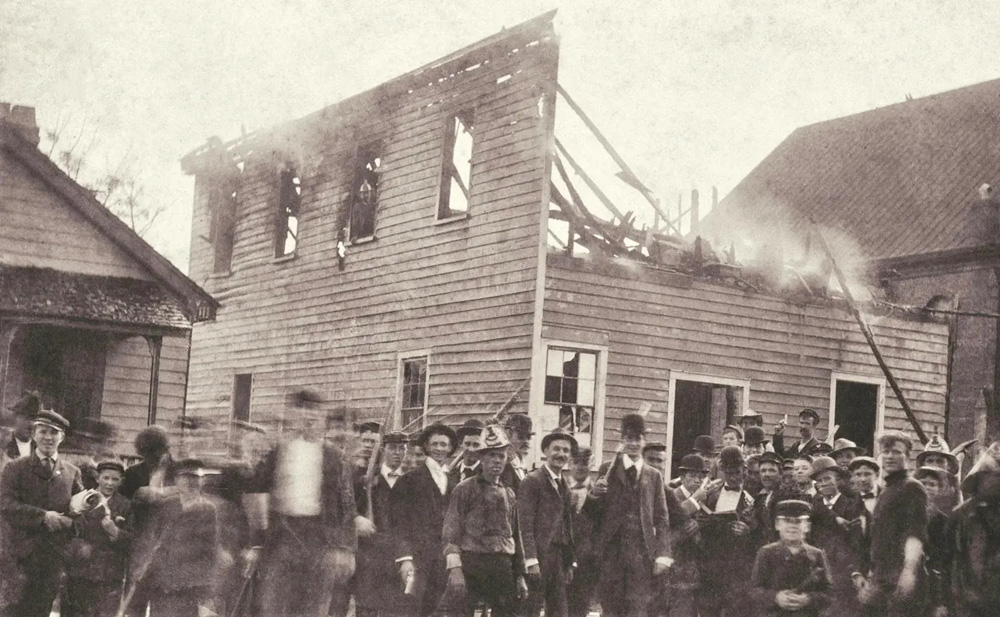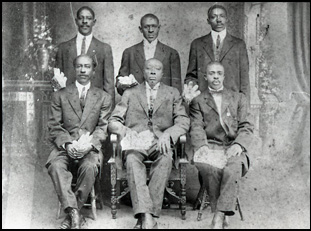In some ways, Brad Lichtenstein and Yoruba Richen were reckoning not only with the history of the United States, but with the history of their own medium in taking on “American Coup: Wilmington 1898” when it was the same event in North Carolina following the Civil War that inspired Thomas Dixon to write the source material that D.W. Griffith’s “Birth of a Nation” was based on. A cinematic landmark by virtue of its length, exceeding the limits of single-reel serials that were virtually all that were possible at the time of its making in 1915 with a two-hour runtime, the film became inextricably intertwined with how the Reconstruction era was remembered in the popular consciousness as it portrayed the Black men (infamously with white actors in blackface) that were suddenly enfranchised and allowed to run for higher office in the wake of the Union prevailing as drunkenly cavorting around state houses. By the time of its release, any power that Blacks had accrued in building communities of their own was being systematically erased both on the ground where Black businesses would be attacked, culminating in the Tulsa race riots a few years later, and in local government where laws were created around voting to prevent people from expressing their right at the ballot box.
After it recently took a season of the HBO series “Watchmen” to remind this generation what happened in Tulsa, the reach of Griffith’s hold on the imagination over all these years could be seen again, which is why “American Coup” becomes such a refreshing corrective. Lichtenstein (“When Claude Got Shot”) and Richen (“The New Black”) head to Wilmington where its geographic position near the Atlantic Ocean made it once a thriving port town where recently freed slaves could start working towards their own benefit and began businesses of their own, as well as presiding over banks that could give start-up loans and publishing a newspaper, the Daily Record. Still, resentment among white landowners who felt their own power was being threatened led to a fracturing of political parties and eventually violence around the 1898 midterm elections in which Black voters were intimidated from casting their ballot and driven out of town as nearly everything they built was burned to the ground.
When Josephus Daniels, the publisher of what is still North Carolina’s most prestigious paper, the Raleigh News and Observer, was among those directly responsible for the event in which it can only be estimated that 40 to 60 people were murdered when some of their remains have never been found, its impact continues to this day and Lichtenstein and Richen find themselves telling a story in the present as much as about the past as they interview descendants of those who lived through it and scholars who continue to grapple with the fallout. Although “American Coup” painfully details how progress could be undermined, it also vividly illustrates what actually did exist in Wilmington when the Black community seized the opportunity to create a space for themselves in society and the chance now for greater reconciliation as more of the truth about what happened in the past comes to light and current residents of Wilmington have a basis to start productive conversations about how what’s been broken can be made whole.
With the film making its premiere on PBS’ American Experience on November 12th, Lichtenstein and Richen kindly spoke about how the two of them joined forces to tell this story, the exchange with subjects who may have been learning as much about their own family history through the film as they were sharing, and the ongoing reverberations of these events in Wilmington.
Yoruba Richen: Brad and I made a film for Frontline called “American Reckoning” [where] we dealt with similar issues later in time, but around racial violence and the implications of that for present-day descendants in the South. Through that, PBS in North Carolina reached out to us and asked if we would be interested in directing this film about Wilmington. I know when Brad asked me if I was down, I immediately was for a number of reasons. I’d known a little bit about Wilmington in 1898, but telling these untold stories, I figure if I don’t know about it, a lot of people don’t know about it and [generally] when starting to understand more of what happened, I know the importance of shining light on these untold stories, so that’s why I was very immediately interested in working on this.
You actually have present-day footage in this of commemorations occurring now in Wilmington. Were you aware of them when diving in?
Brad Lichtenstein: Yeah, our very first shoot was a commemorative event, the 123rd [anniversary], I believe, and it was the procession for Joshua Halsey’s funeral and the soil ceremony. From the beginning, Yoruba and I knew that we wanted to include descendants whose ancestors were part of it and we were very close to the descendants, especially through a group called Coming to the Table that has a Wilmington chapter. A lot of the commemorative events and some of the others in the film were really connected to their work, and a lot of the descendants have been part of that group for maybe a couple of years before we met them. Every year since 1998, they’ve have had events around the same week that the insurrection and massacre occurred. And there’s a local researcher here [in Wilmington] who’s done a lot of genetic research to find new descendants who had no idea that their their ancestry led them back to this story.
There’s a great moment in the film when Lucy McCauley, a descendant of one of the people involved in driving the Black community out of Wilmington, actually brings some artifacts to counter potential claims from others within her own family, and it made me wonder how much of the history the people that you were encountering might have known from their own family history versus what you may have ended up telling them through your own research, because that seems like it must have been an interesting dynamic on this.
Yoruba Richen: Some folks came with knowledge around their ancestors’ role. Lucy had been doing this kind of research for the last few years, so she was someone who had receipts and knew her ancestors’ role. Others [such as] Inez knew some part of it — that her ancestor was on the board of a Black bank, but she also found out through us filming her going to the archives, that in fact, he was also on the board of two other banks. That was a discovery she made through the film.
Brad Lichtenstein: Then Kieran and Priscilla, you see it actually in the film when the eighth copy of the Daily Record, which is the newspaper his ancestor had edited and co-published, was put together from all the little scraps of paper that it had been found in. So it was interesting how some of our research also becomes the research that we see happening live in the film with the involvement of descendants at the same time learning alongside of us.
Was there anything that changed your ideas of what this was as you were moving through it?
Brad Lichtenstein: It’s a process of discovery as you’re making a film and for me, we knew about Josephus Daniels, the editor of the largest newspaper in North Carolina [The Raleigh News and Observer], which became the mouthpiece of the hate and the fear that was stoking the racist flames that led to the violence. But it was surprising when his great-great grandson said yes to being involved in the film and he was very thoughtful about accountability. The way that he was willing to essentially say that it was a shame that Josephus never apologized, never really even understood what he had done was wrong and to acknowledge that he was rewarded essentially for leading such a violent massacre, there was a genuineness that was gratifying for a filmmaker to sit across from him with the camera rolling.
Yoruba Richen: And one of the things doing deep dives on the text of what folks said [at the time] in the articles, just the blatantness of what was in the paper was very interesting to me. The misinformation really resonated to a lot with what we’re dealing with today, so the textual documentation is one of the things that was very was very impactful in researching and figuring out how to tell the story.
It seems like it must be difficult to bring this story into the present, given how archival-based it is, but the moment where you’re having Carol Anderson recall a speech at Thelian Hall, and it’s recounted as if you’re sitting there experiencing it in the moment, what was like to conceive of?
Yoruba Richen: Yeah, that was an early idea. It’s not like they were taking pictures of what was going on, and we had to dig very, very deep to find the archive that we did, but what was there in the newspaper articles, letters or first-hand accounts, we wanted to figure out how to bring that alive. One of the first things that we thought is to have our descendants as well as the experts read this documentation and then we brought in others as well to to do so and that made our editing choices on what made sense.
What’s it like to be putting this out into this moment?
Brad Licthenstein: I think we have to learn and relearn all the time that these kinds of themes are so present in our entire existence as a country, whether it’s stoking fear, particularly using racially charged tropes, or appealing to people’s fears of crime or using disinformation in order to wage a violent or a harmful campaign. This was true 125 years ago, and it’s been true in lots of different moments in our history.
Yoruba Richen: And just if you look at progress and the back and forth that we’ve seen in this country, Wilmington happened at the tail end of reconstruction. And then Jim Crow was instituted and then it was a very dark period for many years. Of course, the Black freedom struggle was happening throughout that, but the Civil Rights Act and the Voting Rights Act weren’t passed until the ‘60s. So the cycles of history are really apparent. Wilmington is part of that cycle, and obviously today, we’re a part of that cycle.
“American Coup: Wilmington 1898” premieres on PBS’ American Experience November 12th at 9 pm/8 pm Central.





